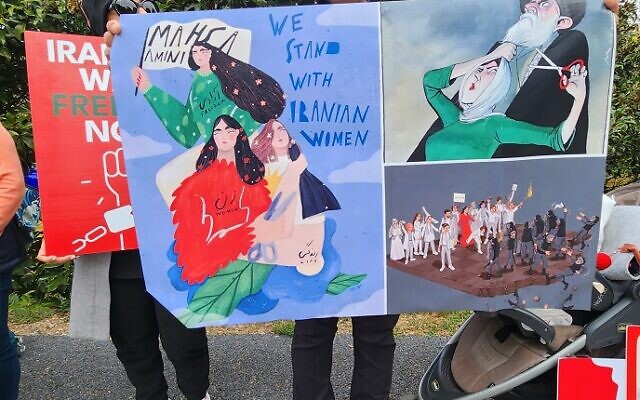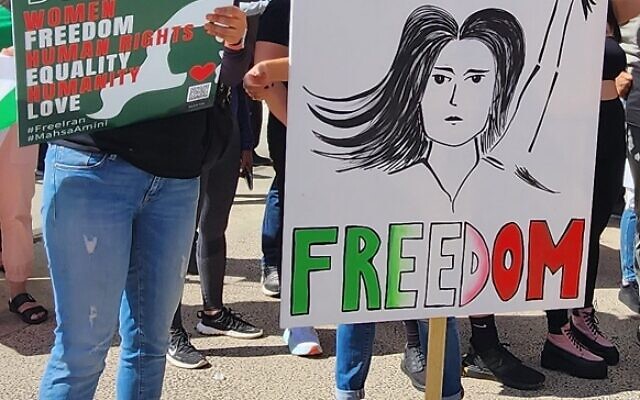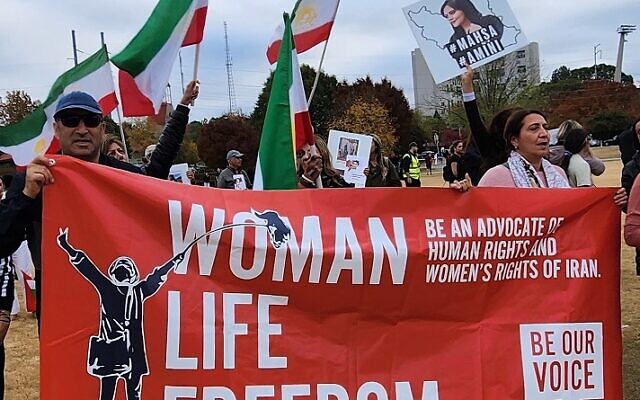Local Iranian Woman Joins Protest
Hengameh Pourfakher attended a woman’s rights rally in Sandy Springs on Nov. 13 and commented on the oppression in Iran that has sparked global outrage.
After 37 years with the Atlanta Journal-Constitution and now with the AJT, , Jaffe’s focus is lifestyle, art, dining, fashion, and community events with emphasis on Jewish movers and shakers.

Some look back on the 2010-11 Arab Spring incidents as examples of the phenomena of demonstrations making international news to draw attention to the plight of repressive Arab regimes. A recent uprising in Iran began this past September following the death of Mahsa Jina Amini, a 22-year-old woman who was arrested in Tehran by the “morality police” that enforces compulsory Hijab laws and has a history of harassing, arresting and beating women.
Amini was reportedly beaten about the head to death while in police custody. According to Jewish Atlantan Hengameh Pourfakhr, “Although her death was the spark for this recent uprising, there have been many uprisings in Iran against the theocratic dictatorship of mullahs over the past 40 years. Unfortunately, they have all been brutally suppressed. The diaspora Iranians have been holding rallies across the world to be the voice of protesters in Iran who are censored in Iranian government-run media and are denied access to Internet every time there is an uprising.”

On Nov. 13, a rally was held at City Springs in Sandy Springs with approximately 1,500 people of all ages and included males. Organized through social media, rallies have been held throughout Atlanta almost every weekend since September.
Pourfakhr was born in Shiraz, Iran, and left at age 18. It took her a year and several countries to finally get U.S. refugee status. Here for 30-plus years, she is an innovation program manager for a large energy company. She has not been back to Iran but wore a headscarf during high school.
Referring to her female contacts still there, “Women in Iran drive and work, and some are even entrepreneurs. They make up nearly 60 percent of higher education students, but less than 20 percent of the workforce. Although all Iranians suffer from extreme inflation, rampant unemployment and suppression of basic freedoms, women suffer additional restrictions treated as a second-tier citizens in courts, are banned from singing or dancing in public and have to get permission from a male relative to travel outside of the country. Also, most public areas, from classrooms and college cafeterias to beaches, are segregated.”

She added that Jews are permitted to operate schools and synagogues and are even allowed to drink alcohol in private, while it is banned for the Muslim population. Officially, the Islamic Republic recognizes and respects “people of the book,” both Christians and Jews. However, just like many other countries, antisemitism still raises its ugly head.
At the Sandy Springs rally, Pourfakhr wore jeans and a T-shirt similar to the signs and placards stating “Woman, Life, Freedom.” Some held pictures of arrested or murdered protesters in Iran. They chanted for freedom and demanded that the mullahs leave Iran and end their brutal dictatorship. The chants also called out Amini’s name and those of the many protesters who were recently killed.
In terms of using identifying photos at the rally, some Iranians worried about threats to their families in Iran or trouble when they visit Iran. However, Pourfakhr is not personally aware of any such cases.
Contrasting life in Iran versus the U.S., she concluded, “I am Sephardic, but I go to a reform synagogue here. As a Jewish woman in Iran, I was free to go to the synagogue of my choice or be active in the various Jewish community centers. But I was subject to the same compulsory systematic Hijab oppressions and violation of my human rights as were my Muslim friends. As a woman in America, I enjoy many freedoms that I didn’t have back in Iran, but I am realizing that the fight for equity and women’s rights is not over, even in America.”
In terms of what it will take to restore equal rights in Iran, she concluded, “Overthrowing of the regime by the people of Iran and its replacement with a secular democracy with many checks and balances.”
Easier said than done…but more power to the people.



comments